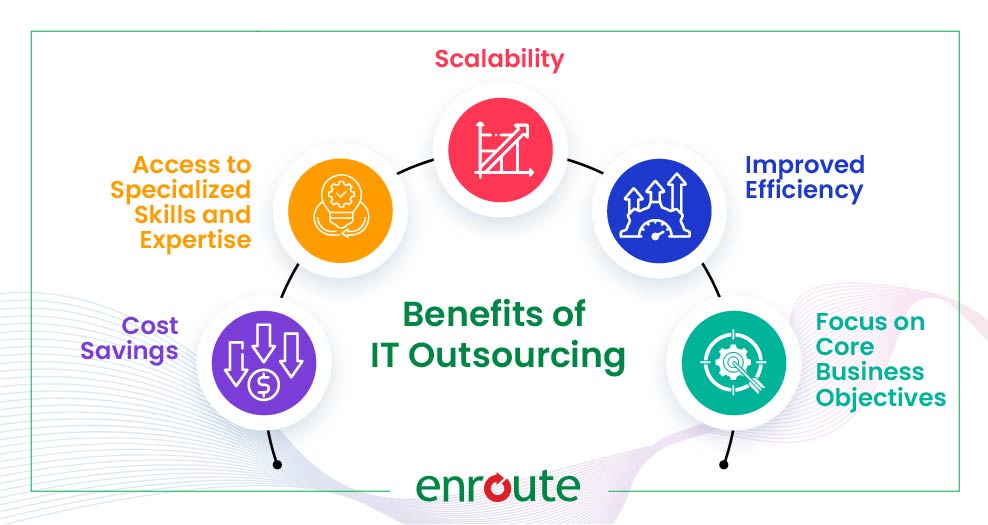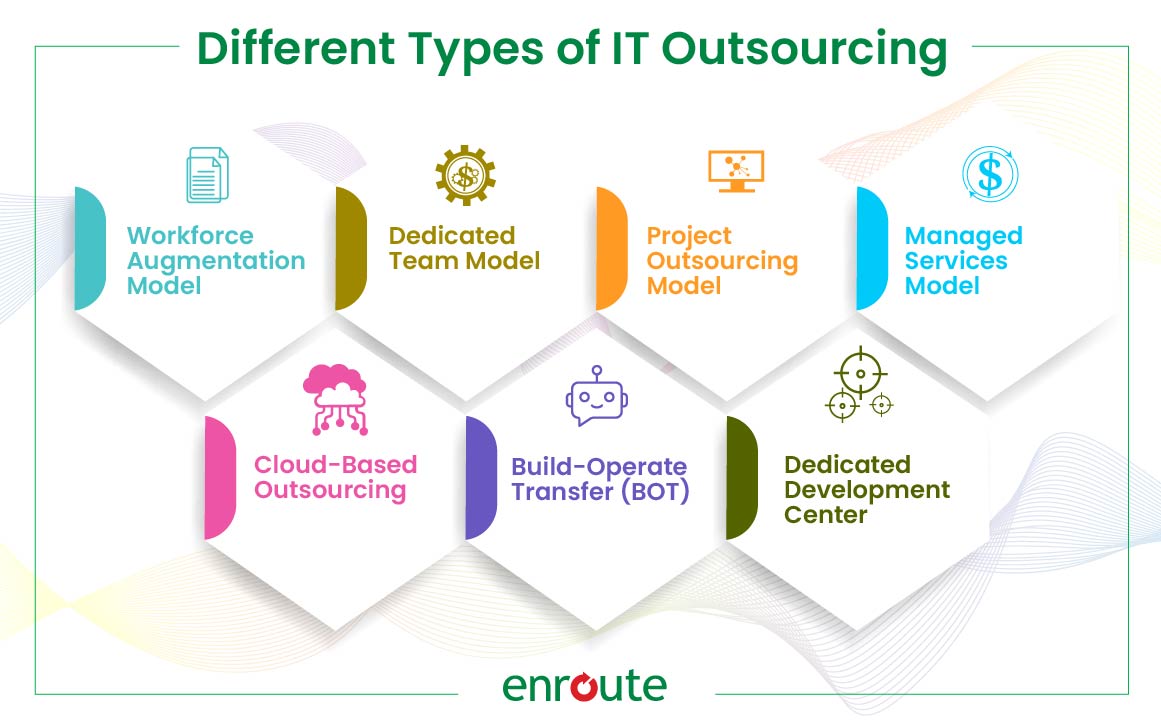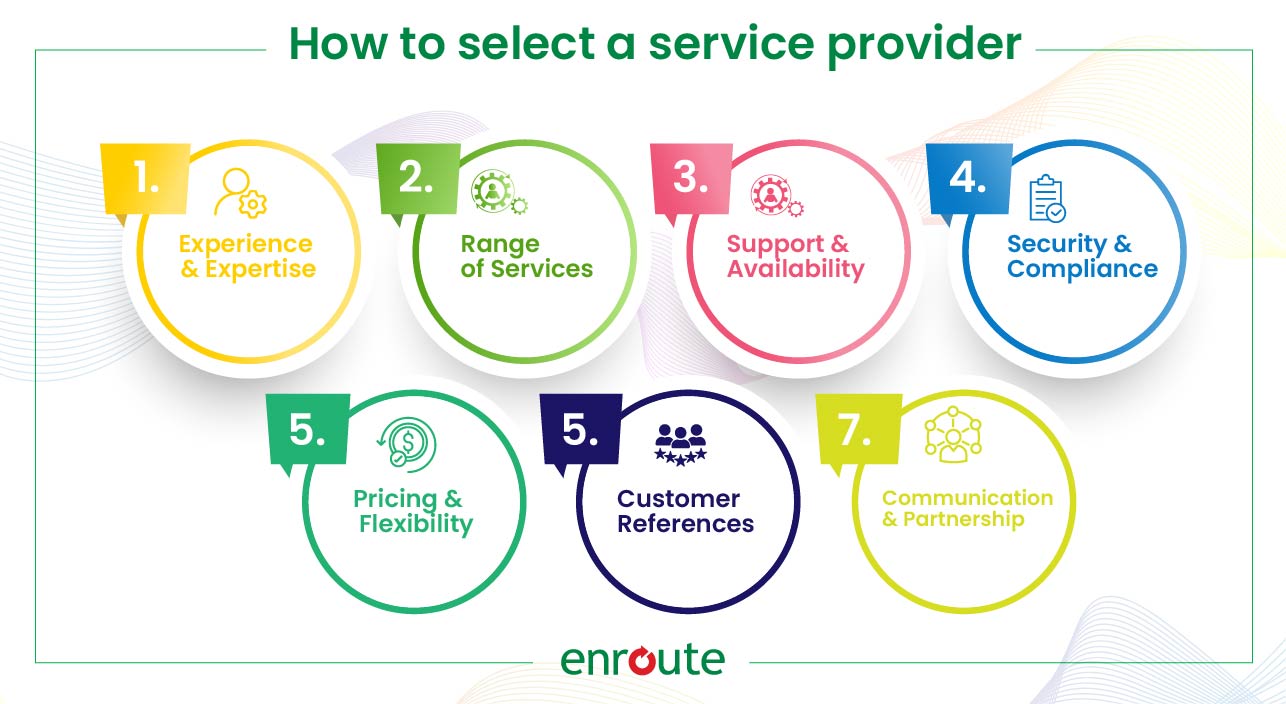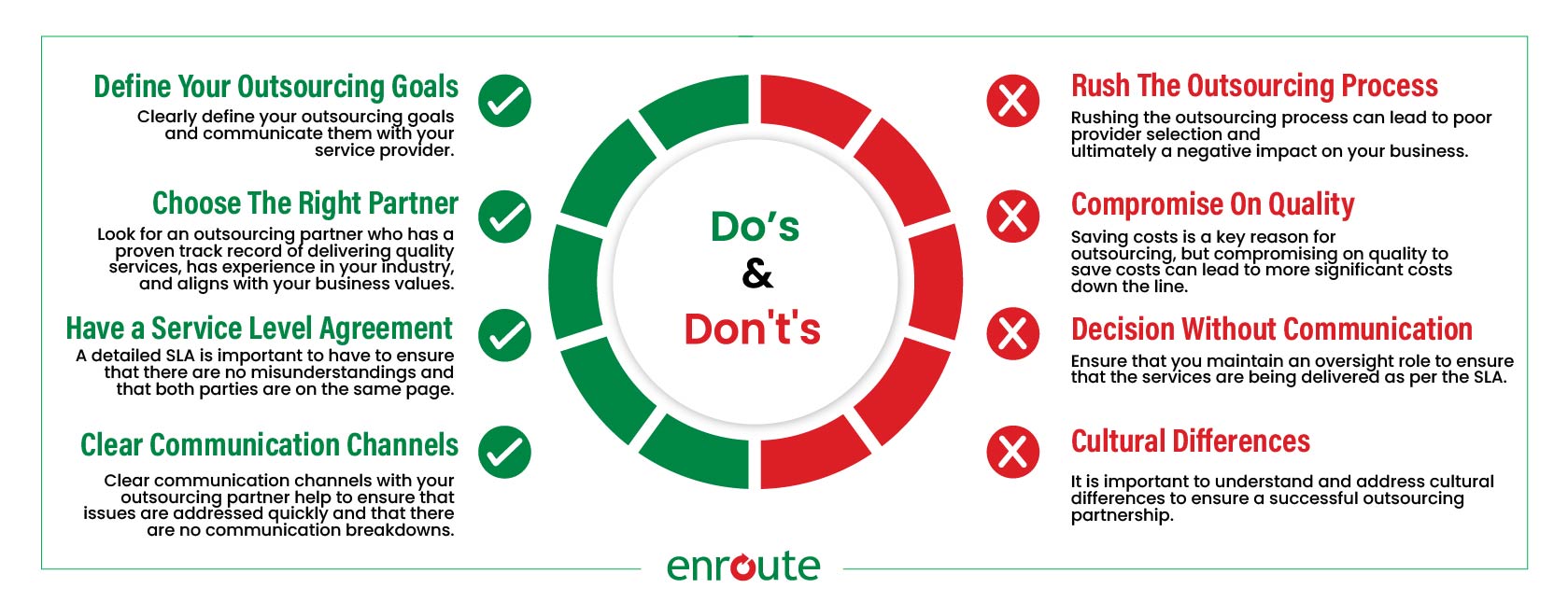Information Technology or IT has become such an inseparable function for business practice in today’s world. While organizations are growing outside national boundaries often the requirement of external providers has become quite important nowadays. An external service provider not only supports the in-house team but also helps to explore new avenues of business improvement.
IT outsourcing is growing rapidly as they are useful to many businesses in different fields. Both big businesses, as well as young companies, benefit from outsourcing. Using a similar strategy you can reduce your costs and create a better competitive advantage. But the question might arise of why a business will require an outsourcing vendor for the IT functions while an internal IT team can manage the requirements. Here in this article, we will discuss the different types, models & reasons behind IT outsourcing for small businesses as well as global companies. Let’s dive right in.
Contents
- 1 Benefits of IT Outsourcing
- 2 Different Types of IT Outsourcing
- 3 3 Common IT Outsourcing Models
- 4 How To Select A Service Provider
- 5 Do/Don’ts of IT Outsourcing
- 6 Risks and Challenges of working with IT Outsourcing Providers
- 7 Future of Offshore Outsourcing
- 8 Negotiating the Best Outsourcing Deal
- 9 Why choose Enroute as your IT Outsource Partner?
- 10 Frequently Asked Questions (FAQ)
- 11 Conclusion
What is IT Outsourcing
IT outsourcing refers to the practice of hiring third-party IT outsourcing vendors to manage some or all of the IT-related work. It can include a wide range of services including software development, infrastructure solutions, help desk support, data analytics, cybersecurity, and more.
The primary purpose of hiring an outsourced team is to achieve lower costs while also achieving better efficiency in the business processes. Outsourcing services are provided in two modalities. Offshore outsourcing and nearshore outsourcing.
Benefits of IT Outsourcing
Outsourcing provides businesses with a competitive advantage by enabling them to access specialized skills and expertise, improve efficiency, and reduce costs. Let’s have a look at some of the more details of outsourcing IT services.
Cost Savings:
Outsourcing IT functions can be more cost-effective than hiring an internal IT team as it helps to eliminate salaries, benefits & overhead costs. It also allows access to higher expertise, better infrastructure & capability in managing risks even better.
Access to specialized skills and expertise:
IT outsourcing provides additional support in getting access to specialized skills and expertise required in the relevant field. Outsourcing contracts can help organizations sort out expertise required in areas of software development, data analytics, cybersecurity & more.
Scalability:
In an ever-changing business environment outsourcing IT functions can help organizations with necessary scalability. IT outsourcing can help to scale up or down the business process in line with business necessity.
Improved Efficiency:
Outsourcing IT functions can help with improved business efficiency as outsourcing contracts can help the client company fully with managed services that provide fast & accurate solutions.
Focus on core business objectives:
Outsourcing IT services can help organizations focus on core business objectives rather than getting into different service levels such as IT outsourcing. For business growth, it’s necessary to focus on what the organization does best, so IT outsourcing can help in this font.

Different Types of IT Outsourcing
The customer chooses to outsource based on the business needs. The requirements may depend upon a long-term plan or a short-term plan & business strategy. Several businesses work with third parties to provide IT services for rapid response to changes in demand. Let’s look at different types of IT outsourcing models that suit your business & planning.
Workforce Augmentation Model:
Workforce augmentation means hiring an IT professional from third-party providers to supplement its existing IT team on a short-term or long-term basis based on needs. The hired IT professional may work at the business’s premises but pay and managed by the external service provider.
Dedicated Team Model:
In the dedicated team model. clients hire a team that creates their projects, and they are working purely for that task. A dedicated IT outsourcing team can help with any technical issue. Usually, a company outsources its tech support team. It will provide suggestions for alternative solutions. When employing a dedicated team, the IT Outsourced Model is ideal for start-ups with a high potential to expand and for complex longer-term projects with high potential.
Project Outsourcing Model:
Outsourced IT projects usually contain projects which have clearly defined beginnings/finishes. In this model, a company outsources a project fully to a third-party outsourcing contract. In this model, the third-party provider is fully responsible for the full project implementation. It includes recruiting, training, facilitation, management, and any other thing required from the client organization. Under this model, the model has fixed costs and a fixed timeline. Within the timeframe, the outsourcing vendor has full responsibility.
Managed Services Model:
The managed services model is an IT outsourcing model where a third-party service provider takes complete responsibility for managing a business’s IT infrastructure, applications, and services. Under this model, the service provider proactively monitors and manages the business’s IT environment, identifies potential issues, and addresses them before they turn into major problems.
Cloud-Based Outsourcing:
Cloud computing or cloud-based outsourcing is an IT outsourcing model where a third-party service provider delivers technical support over the internet using cloud technology. The service provider manages the business’s IT infrastructure, software applications, and data storage on remote servers, and businesses access these services through the internet.
Build-Operate-Transfer (BOT):
Under the BOT or build-operate transfer model an outsourcing partner builds and operates an offshore development center for a company. The outsourcing partner is responsible for recruiting and managing staff, providing infrastructure, and running day-to-day operations.
Dedicated Development Center:
A dedicated development center (DDC) is a fully managed service outsourcing model where a third-party service provider sets up a dedicated team of skilled professionals to work exclusively for a business. The DDC is managed by the service provider under a project manager, and the team works solely on the business’s projects or tasks so the hiring company can focus on its core competencies.

3 Common IT Outsourcing Models
Among many different outsourcing models, 3 are common and widely adopted by companies seeking third-party services for multiple projects. Those are,
- Project Based Outsourcing
- Dedicated Team Model
- Managed Service Model
According to the organization’s needs or necessities, the types of outsourcing models they will prefer varies. At the end of the day, it all comes down to the development of the business, and through these different models of IT outsourcing, the organization can save costs, and access skills while avoiding the engagement of in-house internal resources.

How To Select A Service Provider
Selecting service providers can prove to be a difficult decision. No outsourcer will meet the specific needs completely. Tradeoffs are needed to make the best decisions directing strategy. To find the best cooperation model it is important to know this first when contacting outsourcers because these people will have their ideas for your business based mostly upon the strengths and capabilities of their business.
If you define your needs and prioritize them, you know how to choose an acceptable trade-off. From a common point of view, here are the things that should be considered and not compromised in one provider when selecting a service provider.
Experience & Expertise
When you look for outsourcing companies look for their prior experience in delivering the same kind of support that you require. Also if the service provider can handle new projects according to your requirement.
Range of Services
Analyze the services you may require now and also in near future. Although your requirements may vary widely based on your business in the coming future but make your IT outsourcing service provider can support you with that need.
Support & Availability
It’s okay to partner with a provider who is not in the same time zone. But even if your IT outsourcing vendors are located in a foreign country in a different time zone, make sure they are available at your disposal 24/7 with their full support.
Security & Compliance
Ensure the service provider has necessary security & compliance certifications necessary for the partnership. If your service provider is not from the same country then make sure they have globally recognized certifications.
Pricing & Flexibility
The partnership should not include any hidden costs which might become a burden in the long run. For example, if the IT outsourcing provider has provided software development it should not include the hidden cost of adding new features or maintaining it.
Customer References
Look for previous customer references, case studies, and use case scenarios. Also, reach out to businesses that have taken similar services before to be sure of service delivery.
Communication & Partnership
Proper communication is the key to any fruitful partnership. Look for providers who value communication and transparency also are willing to collaborate as a valuable part of your team.
Do/Don’ts of IT Outsourcing
IT outsourcing comes with a range of advantages such as fulfilling skill gaps, lower labor costs, faster disaster recovery, access to specialized expertise & increased scalability. However, here are some do’s and don’t of IT outsourcing for a clearer view from the client’s point of view.

Risks and Challenges of working with IT Outsourcing Providers
Like any other outsourcing service IT outsourcing also has its risks & challenges if the service level agreement is not done right. Here are some potential risks & challenges you need to look for when considering an outsourcing partnership.
Security Risks
Your outsourcing provider might have access to your sensitive data which might cause data breaches or cyber-attacks. Make sure you address the issues in the service level agreement.
Service Quality Assurance
Outsourcing service providers may not ensure the same quality of service every time. Which might become reputation damaging for your business. So make sure you have checked the previous experience and expertise of the vendor.
Communication Challenge
Language barriers, cultural differences, time zone, etc can arise communication challenges. It is important to be clear about all the communication channels and let your expectations known to the vendor.
Cost Overruns
Outsourcing providers can include additional costs, hidden costs, etc for the service you take. Make sure the cost of every potential service is stated in the agreement.
Loss of Control
You might sometimes feel a loss of control over certain aspects of the business while working with an outsourcing provider. It’s important to establish clear governance & maintain oversight over critical aspects of the business.
Provider Dependency
Outsourcing IT services can also create a service dependency on the provider. It can be challenging for the business if the provider experiences disruptions or goes out of business. So make sure you have a contingency plan in place.
By recognizing the risks & challenges of IT outsourcing, you can be ahead of the potential risks and take necessary steps to mitigate the problems. So it’s important to have a clear idea about the risks you might have.

Future of Offshore Outsourcing
As business is growing globally more and more companies are looking for ways to reduce costs while having expertise at their disposal. IT outsourcing is likely to become an important part of the global economy in the coming future. Here are some trends likely to shape the future of offshore outsourcing.
Focus on value not just cost
As businesses are expanding globally they don’t just look for lower costs but also look for the expertise and experience of the provider to get the best results.
Growing demand for digital transformation
The rapid pace of digital transformation demands for growing necessity for offshore outsourcing providers. For emerging technologies such as Artificial Intelligence, Cloud Computing, and the Internet of Things (IoT) offshore outsourcing is becoming more valuable.
Rise of Nearshore Outsourcing
For a closer cultural and geographical fit, organizations are increasingly looking for nearshore outsourcing for the future as well as costs compared to onshore providers.
Greater focus on Security
With the growing risk of security, as organizations are collecting more data than ever, it has become important for businesses to partner with offshore outsourcing providers who can offer greater security.
Collaborative Relationships
Offshore outsourcing is likely to become subject to more collaborative relationships between clients and providers. In the coming future mutual understanding, shared objectives, and transparency will be more necessary.
Negotiating the Best Outsourcing Deal
Negotiations can be emotionally challenging and sometimes contentious. As an intelligent organization looking to partner with outsourcing partners, you should take charge of negotiations, and prioritize issues that interest them rather than being pushed around by the outsourcing company.
Developing timelines for negotiation can help reduce friction. If not, the discussion will last forever. When something needs time, do not be an obsessive shopper. Lastly, do not attempt to transfer your work in negotiation with a third party.
Why choose Enroute as your IT Outsource Partner?
IT outsourcing in Bangladesh has been increasing in popularity due largely to the growing tech industry and low-cost labor compared to other neighboring countries. Enroute, a well-recognized BPO firm with an impeccable outsourcing reputation for 15 years can be the perfect IT outsourcing partner for your business to ensure growth and sustainability. Under the guidance of expert supervisors and industry-leading capacity, you can outsource your IT functions to us unworried. Get in touch for further assistance.
Frequently Asked Questions (FAQ)
1. What do you mean by IT outsourcing? IT outsourcing is the practice of hiring external service providers to manage some or all of the IT applications of the organization. There are a wide array of IT outsourcing services under IT outsourcing services. Some of them are,
- Application Development and Maintenance
- Infrastructure Management
- Technical Support
- Data Entry and Processing
- Cloud Computing
- Cybersecurity
2. What are the benefits of IT outsourcing? Outsourced IT support offers many advantages. Some of them are,
- Cost savings
- Access to specialized skills and expertise
- Scalability
- Improved efficiency
- Focus on core business objectives
3. What is an example of outsourcing? Some examples of outsourcing can be found in Marketing, office and warehouse cleaning, website building, and web design. The solutions allow enterprises to concentrate on their main activities.
4. What is an example of information technology outsourcing? An example of information technology outsourcing can be software development. The provider could be located in the same country or offshore, depending on needs and budget. Under certain agreements, the provider would be responsible for all aspects of the software development, including design, coding, testing, and implementation.
5. How many companies outsource their IT functions? It is found that, among small businesses that outsource their business process to a third party, 37% outsource either Accounting/Bookkeeping or IT services work. 34% outsource digital marketing functions, 28% outsource development tasks, and 24% outsource either HR functions or customer service work.
Conclusion
In conclusion, IT outsourcing currently and also in the future is likely to introduce lots of benefits to your business in terms of cost savings, global expertise & tackling risks and securities for the future. But also you need to be analytical when choosing the outsourcing partner as well as the goals you are trying to achieve. But all in all, it can be greatly beneficial to your business so you can consider outsourcing your IT functions for your business unhesitantly.

Leave a Reply